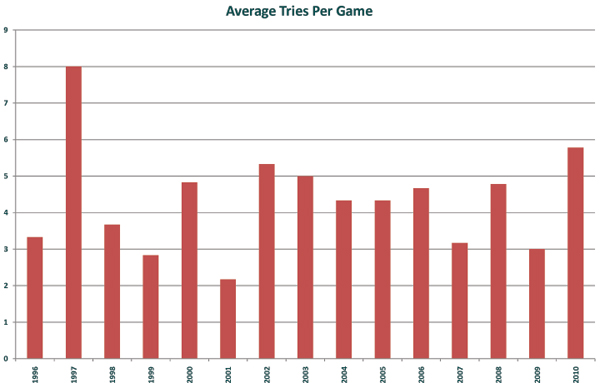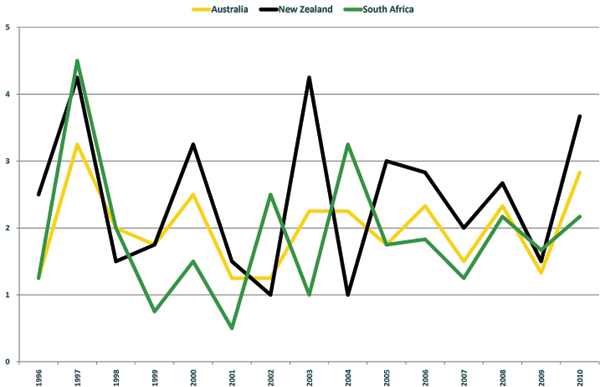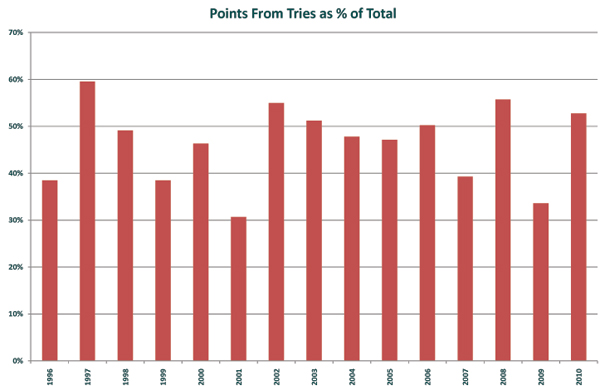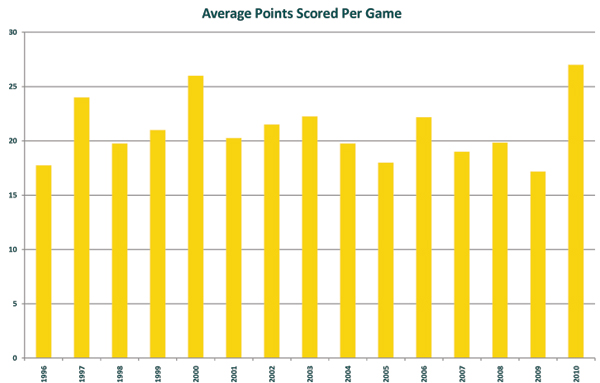John O’Neil has said publicly that he spoke to the Australian coaches prior to the Super 14 in 2010 and asked them to lift the emphasis on attack to provide more entertainment for the good of the game.
After the dour 2009 performance in the Tri Nations where only 27 tries were scored in 9 games, someone from SANZAR would have been justified in having a chat with the Tri Nations coaches to make the same request. I doubt that happened but the change in law interpretations seems to have done the trick as there were more tries scored in the 2010 Tri Nations that in any other year since the competition began.
In total there were 52 tries scored this year, a 93% increase on 2009. Of course that was achieved over 9 games where the previous best of 48 tries in 1997 was achieved over 6 games. Looking at the average tries per game the performance in 1997 was amazing with an average of 8 tries per game compared to the average 5.78 tries per game in 2010. So on average 2010 was actually the second best year for tries scored.
Despite the kick and pressure game the Springboks played so well in 2009 to stifle the opposition, the average 3 tries scored per game last year was not the worst in the history of the Tri Nations, not even the second worst. In 1999 there were only 17 tries scored over 6 games – an average of 2.83 per game. In 2000 the average bounced back to 4.83 tries per game and then in 2001 fell to the lowest ever of 2.17 tries per game, with only 13 tries scored in 6 games. I can’t remember what happened in 2001 that might have contributed to that so hopefully our readers have a better memory than me and can make some comment. The graph below shows the average tries per game across the competition since it began in 1996.
The All Blacks led the way in 2010 with 22 tries, the most they’ve ever scored in the competition. The Wallabies scored 17, again the most they’ve ever scored in the competition. The 13 tries scored by the Springboks was down from their best of 18 in 1997 from only 4 games. The graph below shows the average tries per game for each team since 1996.
Points scored from tries in 2010 represented 52.74% of all points, which is well up on last year’s 33.58% as shown in the graph below.
The Wallabies scored an average of 27 points per game in 2010, their best ever, just shading the 26 points per game in 2000.
Some other statistics you might find interesting:
-
65% of all tries in the 2010 competition were scored by backs, compared to 85% in 2009, 72% in 2008, 68% in 2007 and 68% in 2006. For the Wallabies in 2010 81% of tries were scored by backs, the All Blacks backs scored 68% of their tries whilst only 38% of Springbok tries were scored by their backs.
-
40% of all tries in the 2010 competition were scored where possession started in the attacking teams half compared to 11% in 2009, 67% in 2008, 47% in 2007 and 50% in 2006. For the Wallabies in 2010 35% of their tries started in their own half, for the All Blacks it was 59% and for the Springboks it was only 15%.
-
For the Wallabies 26% of their remaining tries were from possessions that commenced within 10 metres of the try line, 29% within 10 to 20 metres of the try line and the balance 11% started between 20 and 50 metres from the try line.
-
For the All Blacks only 9% of their remaining tries were from possessions that commenced within 10 metres of the try line, 18% within 10 to 20 metres of the try line and the balance 14% started between 20 and 50 metres from the try line.
-
For the Springboks 38% of their remaining tries were from possessions that commenced within 10 metres of the try line, 31% within 10 to 20 metres of the try line and the balance 16% started between 20 and 50 metres from the try line.
In 2008 80% of all tries were scored within 5 phases. In 2009 that jumped to 85% within 5 phases. However in 2010 only 73% of tries were scored within 5 phases. The Wallabies were the only team that had a similar pattern in 2010 to that of 2009 with 81% of their tries scored within 5 phases. The All Blacks scored 73% of their tries within 5 phases and for the Springboks it was only 62%.
The All Blacks had 261 possessions during the Tri Nations and scored 22 tries – an average of a try every 12 times they start possession whereas the Wallabies had 230 possessions and scored 17 tries – an average of a try every 14 times they start possession. The Springboks had 265 possessions and only scored 13 tries – an average of a try every 20 times they start possession.
The area where the Wallabies underperformed was scoring tries in the second half but we didn’t really need these statistics to know that! Across the competition in 2010 44% of tries were scored in the second half. The All Blacks scored 50% of their tries in each half, the Springboks scored 54% of their tries in the second half but the Wallabies could only manage 30% of their tries in the second half. In fact 47% of all of the Wallabies tries were scored within the first 20 minutes of each game.
Whilst the All Blacks led the way in attack this year the statistics show that the Wallabies have also adapted quite well to the new law interpretations and have made solid gains. The trick will be to maintain that trend of improvement in attack.
The Springboks look stuck in the past and that’s supported by the percentage of possession each team kicked the ball this year – 35% for the All Blacks, 37% for the Wallabies and 46% for the Springboks. It’s also supported by the numbers of line breaks made – 44 by the Wallabies, 38 for the All Blacks and only 18 for the Springboks. It’s surely time to make changes in the way the Springboks play the game and that may take a change of coaches to achieve.
It’s great to see a return to attacking rugby in the Tri Nations competition after the grinding rugby played last year. Let’s hope the Northern Hemisphere unions don’t use their clout to have the rule interpretations wound back again but if their teams don’t perform well at the 2011 World Cup, I wouldn’t be surprised if we start seeing the claims that the new law interpretations have tipped the balance too far in favour of the attacking team and if that view won out, that would be a major step backwards.
I expect a really strong showing from the top two teams in the world on their end of year tours this year – I think we’ll see plenty of tries scored by the All Blacks and Wallabies.
I see lots of positives developing for the Wallabies and I’ll give you my tip now – it will be All Blacks v Wallabies in the 2011 RWC final.





